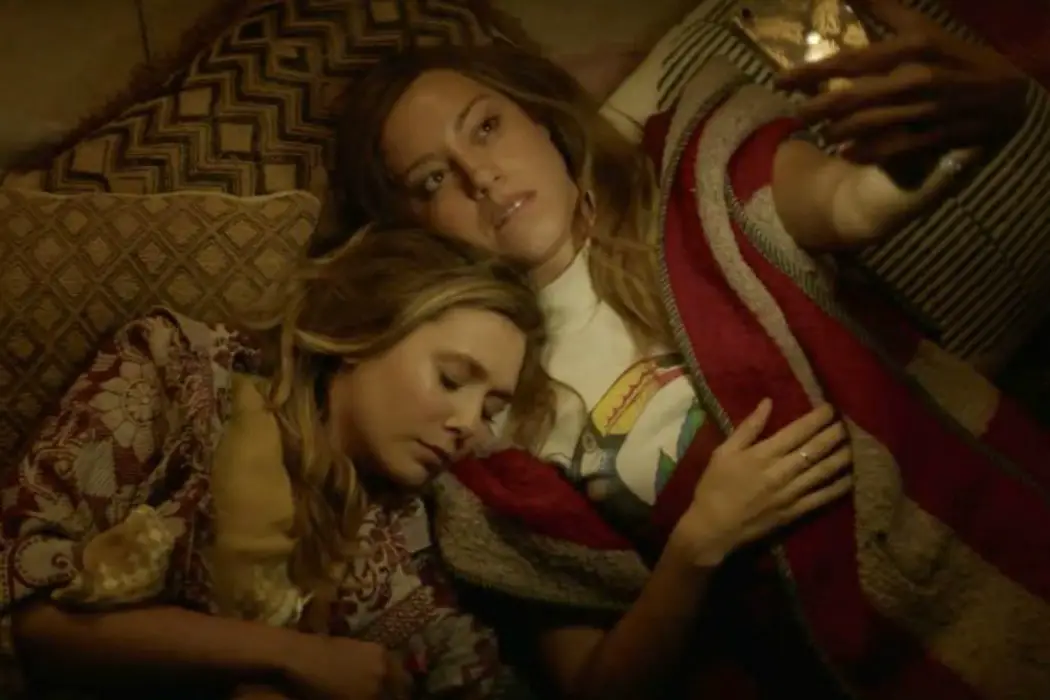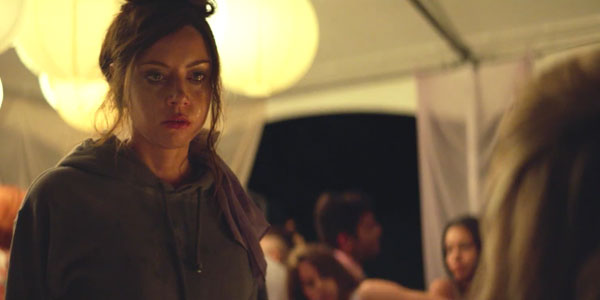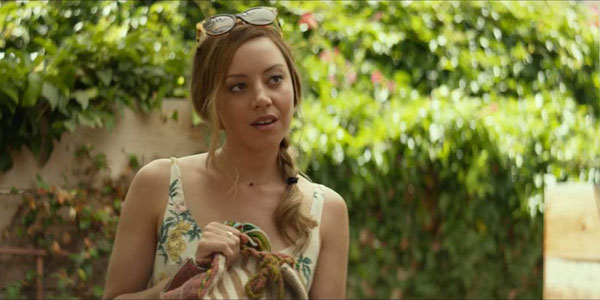INGRID GOES WEST: A Great Social Commentary But Only A Good Dark Comedy

Emma is a brand new graduate of Oberlin College, where…
Ingrid Goes West lets Aubrey Plaza off the chain in a starring role that may very well have been tailor made for her. The social media based comedy, starring Plaza and Elizabeth Olsen, and directed by first time director Matt Spicer, tells the story of a young woman left isolated after the death of her mother and social rejection, who goes to California to stalk, and hopefully befriend, a social media influencer she sees in the pages of a magazine.
The film looks at the way we use social media as a performance of identity and at the construction of social media celebrity. It’s an effectively shot movie, with the over-saturated and colorful visuals supporting and enriching the film’s themes and content. The cast does excellent work, Plaza and O’Shea Jackson Jr. especially, but at times the script falls flat of the dark comedy needed to pull the story along. Ingrid Goes West is an effective social commentary, but ultimately that commentary is undercut by gendered stereotypes that inform the plot and an inconsistent comedic tone.
Ingrid (Aubrey Plaza) goes to Venice Beach, California, following a stay in an inpatient care clinic, the result of crashing a wedding and pepper spraying the bride in retaliation for not being invited. After the rejection at the wedding, in which Ingrid saw the bride as a close friend after she left a single comment on an Instagram post of Ingrid’s, Ingrid looks for a new ideal friend to fixate on, and finds one in Taylor Sloan.

Taylor (Elizabeth Olsen) is a professional influencer in California, whose impeccably curated Instagram shows a perfect, stylish life that Ingrid covets. Using the money left in her mother’s will, Ingrid drops everything and moves to Venice Beach, intent on winning Taylor’s friendship. She stalks the other woman, going so far as to steal her dog in order to return it, as a desperate tactic to meet Taylor. After taking on Taylor’s mannerisms and style, as seen through her Instagram account, their first meeting sparks an immediate, superficial friendship.
Taylor is quick with her superlatives, and the first time the two women spend time together after their meeting, Taylor assures Ingrid that she loves being friends, and that Ingrid is special and important to her. Ingrid is desperate to preserve this friendship, and the social media attention a public friendship with an Instagram celebrity confers upon her. Ingrid becomes increasingly volatile in her attempts to preserve this, as their friendship is threatened by Taylor’s suspicious and unpredictable brother, Nicky (Billy Magnusson), new, more interesting friends, and Ingrid’s own accumulating lies.
Instagram Famous
This is the strongest film about technology and social media in quite some time, as it looks at social media as an extension of the ways humans interact with each other, rather than treating it as something that completely changes the way humans interact with the world. Ingrid Goes West is divorced from the cultural technophobia that sometimes seems to plague media like Her or Black Mirror, and instead argues that social media is just technology that allows people to present themselves the way they wish to be seen, and that the decisions involved in this presentation are all choices of the user, not effects of the technology. In the film, everybody relies on social media to connect to others and keep people updated, as in reality.
The film doesn’t paint people as beholden to social networks, with the obvious exception of Ingrid’s fixation on Instagram, but instead shows social media as a regular part of interaction. After meeting Ingrid, her landlord, Dan (Jackson) immediately follows her on Instagram; when hanging out with Ingrid for the first time, Taylor tags her in a photo. Even Ezra (Wyatt Russell), Taylor’s husband, who proudly has no social media presence, replicates the patterns of social media that craft false narratives, as an artist who takes other people’s paintings and prints a social media ready hashtag over them, labeling that as his own work.

The film does an excellent job at investigating the inherent untruth of performing identity on social media. Over the course of the film, Taylor’s perfect life is unravelled, revealing an unhappy marriage, struggling brother, and a disingenuous personality lying behind the picture perfect Instagram profile. Ingrid’s own lies, remaking her real life, as well as her online presence, can be read as an exaggeration of the falsehood that underlies most online profiles, just taken to a dangerous, unhealthy extreme. Everybody in the film is performing through their social media, or lack thereof, but Ingrid is performing in her daily life.
What A Girl Wants
Ingrid Goes West is defined by the relationship between its two female leads, how it is toxic, and destined to fall apart. It may feel reductive to ask, considering the overwhelming lack of comedies led by women in front of the camera, but is Ingrid Goes West a film that could have been made with male leads? In many ways, it seems that the film depends on a certain expectation of behavior from its two female leads, which is behavior motivated by jealousy, desire for validation, and a sense of perfectionism that could be dismissed as superficial.
These are all qualities stereotypically assumed to be traits of femininity, which raises the question: is a film led by women innovative, progressive cinema, if it relies on negative stereotypes of women to motivate a story? Within the still limited selection of films led by multiple women, there is a significant mass of films where the motivating story-line is that one woman wants what another one has, and wants it enough to turn on her. Films like Always Shine, Queen of Earth, Black Swan, Single White Female (which has garnered numerous comparisons to Ingrid Goes West in recent press) or this year’s Unforgettable, rely on an expectation that that women are jealous.
The scarcity of similar films led by men seems to suggest that within the world of cinema, audiences are expected to view jealousy and irrational responses to envy as largely feminine traits. Film about women that lies rooted in gendered experiences is absolutely a worthwhile and important mode of cinema, but this film is not that; it is one rooted in stereotypes of femininity that are conflated with the lived experience of women. This is worth further thought in light of director Matt Spicer’s second feature, the upcoming film Flower.
Flower, which Spicer is credited as writing, is a comedy about a teenage girl who has sex with adult men in order to exploit them, and establishes a pattern in Spicer’s work; films written and directed by men that explore the interpersonal struggles of vulnerable young women. This is not to say that men can never make effective films about women that feel true to the lived experiences of women, but when films, such as Ingrid Goes West, attempt to present the perspectives of women and are ultimately out of touch with those varied experiences, it is worth considering that it may be the result of excluding women from roles behind the camera.

Though the social critique of the way we use social media is effective and cutting, the film is weakened by the gendered clichés that define Ingrid and Taylor’s relationship, and by at times spotty comedic writing. Ingrid Goes West isn’t a terribly effective dark comedy, in that it has moments of brilliance, but much of the film isn’t dark enough in its comedy to be truly effective. That’s not to say that this isn’t a funny movie, Aubrey Plaza’s performance alone is enough to guarantee humor, but there are enough gags that don’t land – the very character of Taylor’s brother, Nicky, being chief among those – to slow the whole film down.
Ingrid Goes West: Conclusion
A comedy in which the protagonist stalks another woman and kidnaps someone in service of that needs to be incredibly dark in its humor and self-aware of the bad behavior of its lead, but Spicer plays the stalking a little too seriously. There are times the film tests its limits, but ultimately Spicer tows the line in nearly every opportunity to transgress, and push the comedy into darkly comedic territory. These moments of truly dark comedy; Ingrid’s violent wedding crashing and the kidnapping sequence, in particular, stand out as tonally darker than much of the rest of the film, and provide a good look at what the film could have been if had been willing to go off the rails just a little more fully.
Ingrid Goes West is a solid comedy, and it’s a funny movie, but it’s one with the potential to be better and funnier, and seeing these standout moments of biting social critique or madcap dark humor is ultimately frustrating when followed by more complacent moments.
What did you think of Ingrid Goes West? Let us know in the comments.
Ingrid Goes West was released in the US on August 11, 2017 and will be released in the UK on November 17, 2017. For the release dates in your country see here.
Does content like this matter to you?
Become a Member and support film journalism. Unlock access to all of Film Inquiry`s great articles. Join a community of like-minded readers who are passionate about cinema - get access to our private members Network, give back to independent filmmakers, and more.
Emma is a brand new graduate of Oberlin College, where she studied religion, cinema studies, and gender, sexuality, and feminist studies. She likes holding dogs like human babies, supporting women in film, enjoying superhero movies unironically, and potted plants. Catch her on twitter for hot takes on whatever's in her Netflix queue.












